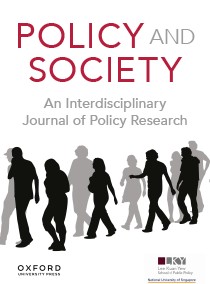Understanding street-level managers’ compliance: a comparative study of policy implementation in Switzerland, Italy, Germany, and Israel
IF 5.7
1区 社会学
Q1 POLITICAL SCIENCE
引用次数: 0
Abstract
This study focuses on street-level managers’ (SLMs) compliance with COVID-19 measures in Switzerland, Germany, Italy, and Israel, in order to better understand their role during policy implementation. Responsible for the direct delivery of public services, street-level organizations serve as the operational arm of the state in general and as the frontline of government policy in times of crisis. SLMs who occupy the top managerial tier within their organization are understudied, although they exert a significant influence on everyday public life. The data comprise 399 “compliance stories” based on interviews with managers in nurseries, schools, health care and welfare offices, police stations, and care homes. Using “codebook thematic analysis,” we identify various levels of (non)compliance and several prominent explanatory factors that shape (non)compliance. Data show that even when asked about particularly challenging measures, managers reported that their organization had been noncompliant (either full or partial) in only about a quarter of the stories. Three influences emerge as primary barriers to compliance—a lack of resources, managers’ relationships with clients, and the perception of the measure’s effectiveness. Emphasizing that SLMs often act as local policy entrepreneurs using their discretion to solve problems and serve the public, our findings further demonstrate the crucial role they play in shaping the face of the government for the people.了解街道管理人员的遵纪守法情况:瑞士、意大利、德国和以色列政策执行情况比较研究
本研究的重点是瑞士、德国、意大利和以色列的街道管理人员(SLMs)遵守 COVID-19 措施的情况,以便更好地了解他们在政策实施过程中的作用。街道组织负责直接提供公共服务,在一般情况下是国家的业务部门,在危机时期则是政府政策的前沿阵地。虽然对日常公共生活具有重大影响,但对组织内最高管理层的 SLM 研究不足。这些数据由 399 个 "遵守规定的故事 "组成,这些故事基于对托儿所、学校、医疗保健和福利办公室、警察局和护理院管理人员的访谈。通过 "编码本主题分析",我们发现了不同程度的(不)合规现象,以及形成(不)合规现象的几个重要解释因素。数据显示,即使在被问及特别具有挑战性的措施时,管理人员也仅在约四分之一的案例中表示其组织不合规(无论是完全不合规还是部分不合规)。有三种影响因素成为合规的主要障碍--缺乏资源、管理人员与客户的关系以及对措施有效性的看法。我们强调,可持续土地管理者通常作为地方政策的制定者,利用其自由裁量权来解决问题和服务公众,我们的研究结果进一步证明了他们在为人民塑造政府面貌方面所发挥的关键作用。
本文章由计算机程序翻译,如有差异,请以英文原文为准。
求助全文
约1分钟内获得全文
求助全文
来源期刊

Policy and Society
Multiple-
CiteScore
18.00
自引率
6.50%
发文量
43
审稿时长
30 weeks
期刊介绍:
Policy and Society is a prominent international open-access journal publishing peer-reviewed research on critical issues in policy theory and practice across local, national, and international levels. The journal seeks to comprehend the origin, functioning, and implications of policies within broader political, social, and economic contexts. It publishes themed issues regularly and, starting in 2023, will also feature non-themed individual submissions.
 求助内容:
求助内容: 应助结果提醒方式:
应助结果提醒方式:


